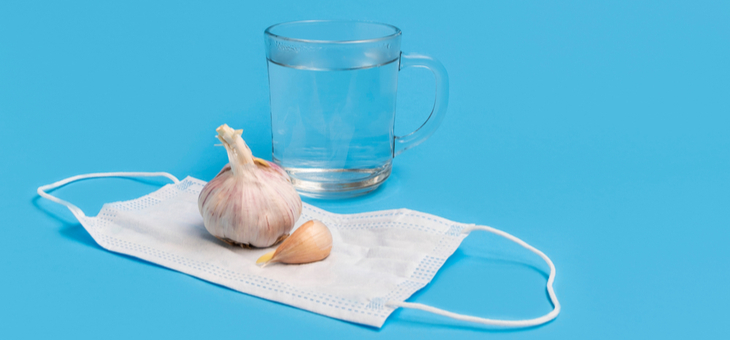The biggest global health crisis for decades was bound to bring about a plethora of health advice, but how do you know what’s reliable and accurate?
It isn’t always easy – especially when certain political leaders are suggesting potentially deadly ideas such as injecting disinfectant as potential remedies.
Researchers say ‘inoculating’ the public against such harmful misinformation has never been more pressing, and they’ve conducted a large international study to assess how much wrong advice surrounding COVID-19 food and eating practices is actually believed.
The study, launched shortly after the start of lockdown by University College London (UCL) and The Health Sciences Academy (HSA), found potentially harmful misconceptions about nutrition and COVID-19, including nearly half (43 per cent) of the 3781 respondents wrongly believing it’s safe to eat fruit and vegetables washed with soap or diluted bleach, and a small minority (3.3 per cent) even thinking gargling with bleach will kill the virus.
Study co-author Alex Ruani, the chief science educator at the HSA and a UCL doctoral researcher, says: “It deeply worries me that potentially harmful dietary practices are being adopted by masses of people based on widespread advice that is erroneous, pulled out of context, or silent about objective health risks. And enough is enough. We must do something about this, sooner rather than later.
“When we accept potentially harmful nutrition information and dietary advice as ‘safe’ and as ‘true’, when we aren’t told about the side-effects or contraindications, and when we change our food choices as a result, our risk of health harm escalates. The danger is that we may not know it until it’s too late and the damage has already been done.”
Encouragingly, 96 per cent of the study participants believed that to reduce the risk of COVID-19 infection, they should avoid direct contact with people delivering groceries or packages, and wash hands thoroughly after bringing in packages or grocery deliveries.
“Most people understand the importance of social distancing in preventing the spread of COVID-19,” stresses study co-author Professor Michael Reiss of the UCL Institute of Education. “However, there are important misunderstandings about the implications of food and eating practices. Governments can help allay fears and reduce COVID-19 transmission by promoting clear public health messages about food and eating,”
Here, Mr Ruani outlines seven potentially harmful misperceptions about health and nutrition in relation to COVID-19.
1. Washing food with diluted bleach
The UCL/HSA study found 43 per cent of participants wrongly believed it was safe to eat fruits and vegetables washed with soap or diluted bleach, supposedly to remove potential COVID-19 viral particles. “It’s not safe to wash your fresh produce with soap or diluted bleach,” says Mr Ruani. “But, quite worryingly, we found a large number of people might be engaging in this harmful food practice despite food authorities’ warnings.”
2. Flushing out coronavirus with water
More than a fifth (21 per cent) of people questioned wrongly believed drinking water flushed all COVID-19 viral particles into the oesophagus and then into the stomach, where they would be broken down by gastric acid. Another 22 per cent were unsure whether this was true or not.
In addition, 25 per cent of people wrongly believed keeping your mouth and throat moist could stop coronavirus, incorrectly assuming saliva can encapsulate and deactivate the COVID-19 virus. Another 29 per cent were unsure whether this was true or not.
3. Neutralising coronavirus with bleach
A small minority of people (3.3 per cent) wrongly believed you could protect yourself from the novel coronavirus by gargling bleach, and a further 7.5 per cent were unsure. In fact, the reality is that gargling bleach may cause poisoning, rather than act as a health aid.
“People can die from following harmful health advice, and sadly government officials are not exempt from spreading risky misinformation,” says Mr Ruani.
One Arizona couple poisoned themselves by ingesting chloroquine phosphate, via a home fish-tank cleaner, after Donald Trump’s televised endorsement of an anti-malarial drug containing chloroquine, despite scientists’ warnings against it.
4. Huge vitamin doses
Taking mega-doses of concentrated vitamin C (8g and above) or vitamin D (10,000 IU and above) isn’t proven to stop people getting COVID-19, or to treat the virus, warns Mr Ruani.
5. Eating herbs and spices
Another unproven treatment for COVID-19 is eating herbs and spices such as garlic, ginger, oregano or chilli. There’s no evidence for this and is complete speculation.
6. Liquid ‘cures’
“There’s also no evidence that gargling alcoholic drinks like vodka or dental mouthwash, or sipping hot drinks such as tea and broth will affect coronavirus.” Mr Ruani stresses.
7. Cold ‘cure’
There’s also no evidence that avoiding cold drinks and cold foods, such as ice-cream, will affect the virus. “There are numerous examples of unproven COVID-19 preventative methods and cures that are being disseminated since the global outbreak,” says Mr Ruani. “These will neither stop you from catching COVID-19 nor make you immune against it.”
Have you heard any of these ‘cures’ circulating as fact? How have you been keeping up to date with coronavirus news?
– With PA
If you enjoy our content, don’t keep it to yourself. Share our free eNews with your friends and encourage them to sign up.
Related articles:
https://www.yourlifechoices.com.au/health/covid19/cannabis-could-combat-covid-death
https://www.yourlifechoices.com.au/health/your-health/how-education-improves-memory
https://www.yourlifechoices.com.au/food-recipes/food/super-healthy-unusual-vegies

